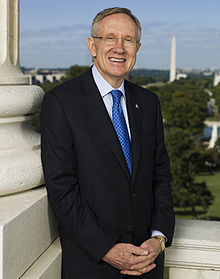Harry M. Reid
Harry Mason Reid (born December 2, 1939 in Searchlight , Nevada , † December 28, 2021 in Henderson , Nevada) was an American politician of the Democratic Party . From 1987 to 2017 he represented the state of Nevada in the United States Senate , from 2005 as parliamentary group leader of his party (from 2007 to 2015 as leader of the majority parliamentary group , Majority Leader).
Family, education and work
Harry Reid was in 1939 as the third of four sons of the miner Harry Reid Vincent (1913-1972) and his wife Inez Orena, born Jaynes (1909 to 1978) in the then 200 inhabitants mining town of Searchlight born, in Clark County outermost on the The southern tip of Nevada is around 80 kilometers south of Las Vegas . He grew up in extreme poverty with his brothers Don, Dale and Larry. His father worked in one of the local gold mines, and his mother did the laundry for some of the city's numerous brothels. In the small town there was only one elementary school up to the eighth grade, so that Reid was forced to go to Basic High School in the industrial city of Henderson (near Las Vegas) about 50 miles away from 1953 . Because of the distance, Reid lived with his father's relatives while he was at school in Henderson and only drove home occasionally on the weekends. At that time he was elected president of the senior class ; the election campaign was organized by his friend Ray Martinez, who from then on accompanied all of Reid's campaigns as his chief of staff.
At Basic High School Reid Landra met Joy Gould (born June 9, 1940), whom he married in 1959 after they both graduated from high school. Their daughter Lana was born in 1961, followed by four sons in 1974 - Rory (* 1963) applied unsuccessfully for the governor of Nevada in 2010 . After graduating from high school, Harry Reid made various scholarships possible first to attend Southern Utah State College in Cedar City , then to study at Utah State University in Logan , which he graduated in 1961. In Logan, the young family moved into the home of Latter-day Saint missionaries and converted to Mormonism. At the university he founded a section of the Young Democratic Club and became increasingly involved in politics. He then studied law at the Law School of George Washington University and graduated in 1964 with a Juris Doctor (JD). During his postgraduate studies from 1961 to 1964, Reid earned a living for his young family by working at night as a US Capitol police officer . After obtaining his license, he worked as a lawyer in Henderson from 1964 to 1966 and a few years later . Reid's father, an alcoholic, killed himself in 1972, which Reid only spoke about publicly 24 years later, thus initiating a public debate on the subject.
Reid died in late December 2021 at the age of 82 of complications from pancreatic cancer .
Political career
Beginnings
After studying in Washington, DC, Reid returned to Nevada and began serving in public office as part of a generation of promising young politicians. He was elected city attorney in Henderson and was elected to the board of the Southern Nevada Memorial Hospital. From 1968 to 1970 he was a member of the State Parliament ( Nevada Assembly ). From 1970 to 1974 he served as lieutenant governor of Nevada under Governor Mike O'Callaghan . They had met in high school, where O'Callaghan had taught history and coached amateur boxer Reid.
Reid first ran for a seat in the US Senate in 1974 , but lost to Republican Paul Laxalt . He was the only Democrat in this election, marked by the Watergate affair , to lose a previously Democratic Congress seat to the Republicans, albeit with a deficit of just 611 votes. In the election to the mayor of Las Vegas in 1975 Reid again suffered a defeat; his political career seemed over, especially since he still owed $ 30,000 from the Senate election campaign. O'Callaghan brought Reid back into politics when he made him chairman of the Nevada Gaming Commission in 1977 . In this prominent position, he dealt with organized crime, was threatened and attempted to bribe, but earned a good reputation and support from the casino industry. He then stood in the 1982 election for the seat of the 1st Congressional constituency of Nevada in the US House of Representatives (which he had rejected in 1972) and won, so that he was a member of the United States Congress from January 3, 1983 . There he was promoted by the parliamentary group leadership by being assigned to the Committee on External Relations and he made ties by joining the California caucus . Among other things, he pushed through the establishment of the Great Basin National Park .
senator
In the 1986 election , Reid was elected to the United States Senate for Nevada , of which he was a member from 1987 to 2017. In the 1986 election campaign, he attacked the mining industry and positioned himself as an environmentalist, which political observers had considered high risk. After being re-elected without difficulty in 1992 , he faced his strongest rival in the 1998 election : He faced Republican challenger John Ensign , who had been a member of the US House of Representatives for Reid's former congressional electoral district, in which the number of as Democrats registered exceeded those of Republicans. Ensign attacked Reid primarily for his controversial support for measures and initiatives to protect the environment. With a total of 416,000 votes cast, Reid prevailed with a 428 vote lead. Even before the Senate election in 2010 , Reid's mandate was long seen in the polls as endangered. It was only immediately before the election that he was able to break away from his Republican opponent Sharron Angle and narrowly win.
In the Senate, Reid sat, among other things, in the powerful Approval Committee . After his re-election in 1999, Reid became part of the parliamentary group leadership. As Assistant Whip of his party, he earned non-partisan respect, which he did not lose when he convinced the former Republican Jim Jeffords in 2001 to join the Democratic group. In early 2003 Reid Whip became the Democratic Senate parliamentary group, moving up to second place in the parliamentary group leadership. After the previous Democratic group leader, Tom Daschle , was beaten in the 2004 election , while Reid was safely re-elected, Reid was elected group chairman in January 2005 and remained so until he left the Senate in early 2017. Reid was initially a minority leader , the leader of the minority faction, and after the 2006 election , which was successful for the Democrats, became the Majority Leader , which he remained from early 2007 to early 2015, when the Republicans regained a majority after the 2014 election . As Majority Leader , Reid was replaced on January 3, 2015 by Republican Mitch McConnell .
In March 2015, Reid announced that he would not run again in the November 2016 Senate election . Previously, he had indicated another candidacy. In his statement, he brought up Catherine Cortez Masto , who would succeed him in the US Senate. Reid's mandate ended on January 3, 2017.
Positions and controversies
Reid was considered a leftist democrat ( "liberal" ), who was particularly known for his commitment to environmental protection. As a senator, he negotiated a solution to a decades-old conflict over the use of the Truckee River . In terms of economic policy, Reid was described as moderate and socio-politically tolerant. He campaigned for a “New West” that should open up economic and social opportunities apart from previous extreme individualism ( Wild West ).
Reid's style was considered reserved and his political rhetoric taciturn; however, he has also sharply criticized political icons such as Ross Perot and Alan Greenspan . During the election campaign for the US presidency in 2008 , Reid said in private that he thought Barack Obama was a promising candidate because he was “a light-skinned black” and “did not speak a Negro dialect”. The American media landscape reacted with critical reporting to this statement. Reid apologized for the wording used by Obama, who declared the case closed.
Web links
- Harry M. Reid in the Biographical Directory of the United States Congress (English)
- Karen Tumulty: The Democrats' Inside Man. In: Time Magazine , April 24, 2004.
- Dennis Myers: Harry Reid. In: Online Nevada Encyclopedia , October 14, 2010 (English).
Individual evidence
- ↑ David Cohen: Harry Reid, former Senate leader, dead at 82. In: Politico , December 28, 2021, accessed December 29, 2021.
- ↑ Elsa Walsh: Minority Retort. How a Pro-Gun, Anti-Abortion Nevadan Leads the Senate's Democrats. In: The New Yorker , August 8, 2005; Sen. Harry Reid's Speech. In: Brigham Young University - BYU College Democrats , October 9, 2007 (PDF) .
- ↑ a b Sen. Harry Reid's Speech. In: Brigham Young University - BYU College Democrats , October 9, 2007 (PDF) .
- ↑ a b c d e f Jon Christensen: A senator for the New West in the race of his life. In: High Country News , Sept. 28, 1998.
- ↑ Jay David Murphy: Sen. Reid releases statement on his father's suicide 37 years ago. In: Digital Journal , September 9, 2009.
- ↑ Harry Reid is dead. In: Spiegel Online , December 29, 2021, accessed on December 29, 2021.
- ↑ a b c d e Dennis Myers: Harry Reid. In: Online Nevada Encyclopedia , Oct. 14, 2010.
- ^ Statistics of the congressional election of November 3, 1998. Office of the Clerk, US House of Representatives; Dennis Myers: Harry Reid. In: Online Nevada Encyclopedia , Oct. 14, 2010.
- ↑ Jeremy W. Peters, Ashley Parker: Harry Reid Gets an Earful Before Being Re-Elected to Lead Democrats. In: The New York Times , November 13, 2014.
- ^ Harry Reid to Retire From Senate in 2016. In: The New York Times , March 27, 2015.
- ↑ Chris Cillizza: Majority Leader Reid Apologizes to Obama for 2008 Remarks. In: The Washington Post , Jan. 9, 2010; David Jackson: Harry Reid Taking Heat for Obama Remarks. In: USA Today , January 10, 2010.
| personal data | |
|---|---|
| SURNAME | Reid, Harry M. |
| ALTERNATIVE NAMES | Reid, Harry Mason (full name) |
| BRIEF DESCRIPTION | American politician |
| BIRTH DATE | December 2, 1939 |
| PLACE OF BIRTH | Searchlight , Nevada |
| DATE OF DEATH | December 28, 2021 |
| PLACE OF DEATH | Henderson , Nevada |




